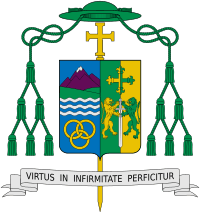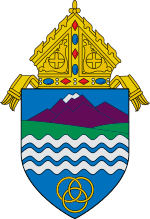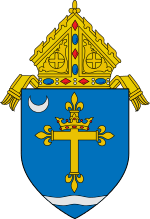Michael John Sheridan
Michael John Sheridan (born March 4, 1945) is an American prelate of the Roman Catholic Church. He is the Bishop of Colorado Springs.
Michael John Sheridan | |
|---|---|
| Bishop of Colorado Springs | |
| Archdiocese | Denver |
| Diocese | Colorado Springs |
| Appointed | December 4, 2001 |
| Installed | January 30, 2003 |
| Predecessor | Richard Charles Patrick Hanifen |
| Orders | |
| Ordination | May 29, 1971 by John Carberry |
| Consecration | September 3, 1997 by Justin Francis Rigali, Edward Joseph O'Donnell, and Edward Braxton |
| Personal details | |
| Born | March 4, 1945 St. Louis, Missouri |
| Previous post | Auxiliary Bishop of St. Louis |
| Motto | VIRTUS IN INFIRMITATE PERFICITUR |
| Styles of Michael John Sheridan | |
|---|---|
 | |
| Reference style | |
| Spoken style | Your Excellency |
| Religious style | Bishop |
Biography
Michael Sheridan was born in St. Louis, Missouri, to John and Bernice (née Moore) Sheridan, and studied at St. Louis University High.
He was ordained to the priesthood by John Cardinal Carberry on May 29, 1971, and then did pastoral work in the Archdiocese of St. Louis. He also taught on the theological faculty of Kenrick-Glennon Seminary.
In 1980 he earned a doctorate in theology from the Pontifical University of St. Thomas Aquinas, Angelicum in Rome with a dissertation entitled The Theology of the Local Church in Vatican II. Bishop of Colorado Springs.[1]
Auxiliary Bishop of St. Louis
On July 8, 1997, Sheridan was appointed Auxiliary Bishop of St. Louis and Titular Bishop of Thibiuca by Pope John Paul II. He received his episcopal consecration on the following September 3 from then-Archbishop Justin Francis Rigali, with Bishops Edward Joseph O'Donnell and Edward Kenneth Braxton serving as co-consecrators. He chose as his episcopal motto: "Virtus in infirmitate perficitur" (2 Cor 12:9, meaning, "Strength is made perfect in weakness").
Bishop of Colorado Springs
Sheridan was named Coadjutor Bishop of Colorado Springs, Colorado, on December 4, 2001, later succeeding Richard Hanifen as the second Bishop of Colorado Springs upon the latter's resignation on January 30, 2003.
Within the United States Conference of Catholic Bishops, Bishop Sheridan sits on the Committee on Education. He is also a member of the Board of Governors of the Pontifical North American College in Rome, of the Board of Directors of Catholic Relief Services, of the International Dominican Foundation, and of the Kenrick Seminary Board of Trustees.
Controversy
Sheridan excited controversy in 2004 when he said any Catholic who does not reflect church teaching in the voting booth "makes a mockery of that faith and belies his identity as a Catholic," a remark widely held to refer to supporters of John Kerry, though the bishop stated "the church never directs citizens to vote for any specific candidate." The directive was reported to be the first in the nation "that would apply to voters the same controversial sanctions proposed by some bishops against abortion-rights Catholic politicians...also one of the most drastic—equating a particular vote with sinful activity."[2] Sheridan's stance drew national attention and harsh criticism, which he then softened in a column in the diocesan newspaper. Sheridan's spokesman has said that there is no Communion ban and that decisions on taking Communion rest with individuals and their consciences.[3]
There was further controversy in 2005 when Sheridan's executive assistant, Peter Howard, wrote a column in the diocesan newspaper stating that participating in Protestant services is contrary to church teaching. Sheridan then issued a public apology stating that Howard's view "does not represent my thinking on the subject". Other prominent clerics in the diocese agreed with Sheridan, saying that Catholics should be encouraged to participate in Protestant services.[4]
See also
- Catholic Church hierarchy
- Catholic Church in the United States
- Historical list of the Catholic bishops of the United States
- List of Catholic bishops of the United States
- Lists of patriarchs, archbishops, and bishops
References
- http://www.diocs.org/About/BishopSheridan.aspx Accessed 16 August 2013
- http://www.christianitytoday.com/ct/2004/mayweb-only/5-10-53.0.html
- http://webcache.googleusercontent.com/search?q=cache:msBaQePpL5UJ:permalink.gmane.org/gmane.music.dadl.ot/7315+&cd=4&hl=en&ct=clnk&gl=us
- http://gazette.com/bishop-apologizes-for-aides-remarks-on-protestant-service/article/8808
External links
Episcopal succession
| Catholic Church titles | ||
|---|---|---|
| Preceded by Richard Charles Patrick Hanifen |
Bishop of Colorado Springs 2003 – present |
Succeeded by incumbent |
| Preceded by – |
Coadjutor Bishop of Colorado Springs 2001 – 2003 |
Succeeded by – |
| Preceded by – |
Auxiliary Bishop of St. Louis 1997–2001 |
Succeeded by – |

